Rachel Neumeier's Blog, page 81
February 16, 2023
The Intuitive Writer
A post at The Creative Penn: Intuitive Writing And Book Marketing With Becca Syme
Wait, writing AND marketing?
Well, that is the idea: Do you sometimes just ‘know’ when a story is right? Does something ‘click’ during the writing process and suddenly things make sense? Do you lean into your curiosity and emotion when it comes to writing and marketing?
I think I’d have separated these out into two different posts, but okay. This is actually a podcast interview, but with a written transcript.
Today we’re talking about Dear Writer, Are You Intuitive? co-written with Susan Bischoff, which was one of my books of the year in 2022. So welcome back to the show, Becca. …
… [A} lot of intuitives who are writers will have watched movies, read books, listened to oral storytellers who are extremely proficient at storytelling, and they will have naturally intuited the connections between plot points, and then they will write their books according to that intuition. … you’ll be watching a movie, and you’ll see the flavor of a particular line of dialogue that produced an emotion in you, and then you’ll know once you’ve seen that 10 or 15 times, you will know how to utilize that device in your own writing, but you could not describe to me how you do it.
Yes, yes, this is all true, but why is this worth pointing out? What’s the point here?
Here it is:
The reason people tell us you can’t write without intention is because they can’t. So the people who are … teaching this stuff [eg intentional plot structure such as putting the inciting incident at the 10% mark], have come about their theories honestly. … of course, there should be a complete guide to [being an intentional writer, an outliner], which there is. There’s plenty of them, we don’t need another one. Like, there’s a lot.
What we need is more information about how to be a good discovery writer. Not how to use plotting techniques to correct a behavior that is not incorrect, but how to be a good discovery writer. How to use tools and tactics to get unstuck consistently, things like that, so that we’re not putting undue stress on ourselves. But also, we need to learn how to trust the intuitive storytelling mechanism that’s inside.
Bold is mine, added just for clarity. And as you see, I’ve added or rephrased stuff in square brackets, again to improve clarity since I’m lifting this out of its full context. But I think this is a useful and important observation, that the lion’s share of writing advice is meant for writers who write via outlines, analytically, possibly paying close attention to “save the cat” or other patterns that are frequently taught to prospective writers. I first heard about the “save the cat” thing as “pet the puppy.” Either way, that’s the moment near the beginning of the story when the protagonist is established as sympathetic because he or she does something nice because they just want to; eg, save a cat.
Here’s a pictoral representation of that pattern:

And, importantly, this kind of advice is not helpful to intuitive writers (discovery writers, pantsers). This reminds me of something I said in a recent post, that I’m just as glad there was much less writing advice available when I was starting to write, because I agree with the linked post that analyzing story structure may be interesting, but is not at all helpful to discovery writers; and that telling discovery writers or pantsers that they’re doing it wrong — which I do in fact see ALL THE TIME — is not a great thing to do.
I’m thinking here of the continual drumbeat of advice that goes like this:
–You should outline
–No, really, if you aren’t outlining, you should outline
–You’d be so much faster if you outlined
–You should definitely outline
And yes you do see this kind of dogmatic advice to outline everywhere, on all kinds of blog posts and in all kinds of Quora answers and just everywhere. This is fine for me because I have no trouble ignoring advice that doesn’t work for me, but even I notice how often that advice appears and how absolutely certain of themselves the people who offer that advice usually sound. It’s not fine to continually press this advice on prospective writers who think maybe they should take it seriously when they really can’t and also shouldn’t try to force themselves to do so.
Again, whether you’re intuitive or not, I think you should always be developing your craft, period. But what I would do when you’re getting edits, or when you’re getting feedback on your story, is I would be asking about the quality. Does the quality of the edit match my personal storytelling preference? Because if the editor is telling you, “Hey, you waited too long for the inciting incident,” and when you ask them about it, they say, “Well, because it has to happen at 10%,” then they are not the right editor for you. Like they’re just not.
Bold in the original, and right, this is true, if an editor think the inciting incident, what “save the cat” refers to as the catalyst, has to happen at the 10% mark, then the editor isn’t evaluating whether the story actually works with the inciting incident somewhere else.
The inciting incident, as you would expect, is the event that occurs near to the beginning of your story, the trigger that sets your protagonist and the story moving in a different direction. I’m pausing here to ask, what is the inciting incident in Tuyo? That incident doesn’t occur at the 10% mark, does it? No. It occurs at the 0.1% mark, about two pages into the story, when Ryo meets Aras for the first time. In my opinion, that is the actual inciting incident. Good thing it never occurred to me to wonder if that was a good place for the inciting incident.
The post goes on:
And of course, there are intuitive editors, in the same way that there are intuitive writers. And so I would always be on the lookout for someone who is going to ask the right questions of your books, and not someone who is going to only ask structural questions.
Right, and I think the only question that actually matters is: Does the story work as well as it can? If not, what could be improved? And those are not structural questions. The answers to those questions might or might not involve story structure. And this is what we see as the takehome message from the linked post as well:
“Is the story compelling?” is the right question to ask. And I would say, so how do we get there if we’re newer? I would always try to follow the intuition that you have about the way you want to write the story.
And then check your intuition against someone who will tell you if the story is compelling or not. I wouldn’t trend towards trying to outline first, unless you literally can’t think of anything else to do, or your intuition is like, “no, I need to know what the structure is,” and then I would listen to that. … it’s possible that you need to experiment. But I would also always listen to your own intuition first, before you listen to teachers, period.
Bold in the original, and wow, is it refreshing to see someone say, “I wouldn’t try to outline first unless you literally can’t think of anything else to do.”
That’s not where the linked post ends — it’s quite long — and I will end with a bit that is particularly funny:
No one knows 100% how a book is going to do because this industry is run by Loki, the god of chaos.
And it is not run by Captain America, the god of logic. I know Captain America is not a god, but like, I mean, you could make an argument. But that’s not how the industry works. It is not predictable in that way.
And then the post segues into marketing. By all means click through and read the whole thing if you’re interested — this is a good post, not one of the facile short ones that someone tossed on the page in five minutes, but thoughtful and interesting.
Please Feel Free to Share:






The post The Intuitive Writer appeared first on Rachel Neumeier.
February 15, 2023
The Shuddering City by Sharon Shinn
Just thought I’d point out this recent post at Mary Robinette Kowell’s blog: My Favorite Bit: Sharon Shinn Talks About THE SHUDDERING CITY
Brandon has recently arrived at the mansion where Villette is being kept under house arrest. He has been warned that Villette will try to win him over so that he’ll help her escape, so he knows he should be wary as she asks him questions about his family, his affections, and his dreams. But he can’t help himself. Her mix of light charm and deep wistfulness fills him with a desire to protect her, comfort her, and distract her. So one night as they happen to be alone in the walled garden of Villette’s compound, he tells her stories about his island life. Eventually, he pulls out his amulet that shows Zessaya in one of her twelve formal poses. Villette takes the amulet from his hand, studies it by moonlight—and swallows it.
I was nearly as surprised as Brandon.
Ah, yes, I remember that moment in The Shuddering City! I was also surprised, that’s for sure. I will say, this was almost totally unlike the way the interpreter ate the clam in Ancillary Mercy.
Please Feel Free to Share:






The post The Shuddering City by Sharon Shinn appeared first on Rachel Neumeier.
Nine Recommendations
So, we’ve seen a flurry of recommendations in the comments here recently. Let me pull some out and take a look. (If you have recently made a recommendation and I missed it, drop it BACK in the comments to THIS post, and I’ll try to pay better attention next time.)
All right, here we go.
Alison: I’d like to (again) recommend Fire Logic and Earth Logic by Laurie Marks: great world building, great writing, amazing symbolism, great story, great endings. I think I may prefer Earth Logic (the sequel) to Fire Logic because of the baker, but, no spoilers.
1. Fire Logic by Laurie Marks
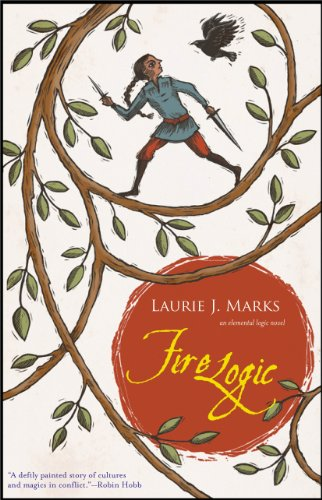
In the border regions of northern Shaftal, the peaks of the mountains loom over hardscrabble farmholds. The farmers there build with stone and grow in stone, and they might even be made of stone themselves, they are so sturdy in the face of the long, bitter winter that comes howling down at them from the mountains.
The stone town of Kisha would have been as insignificant as all the northern towns, if not for the fact that Makapee, the first G’deon, had lived and died there. His successor, Lilter, had discovered the manuscript of the book in which were laid out the principles that were to shape Shaftal. Suring the next two hundred years, the library built to house the Makapee manuscript had transformed the humble town into an important place, a town of scholars and librarians who gathered there to study and care for the largest collection of books in the country. The library had in turn spawned a university, and the scholars, forced to live in the bitter northern climate, tried to make their months of shivering indoors by a smoky peat fire into an intellectual virtue.
All setting and backstory! I don’t dislike it, though, and that’s because of the writing itself. If you’re going to open with setting and backstory rather than with the story, then it’s a good idea to have sentences such as “build with stone and grow in stone and might even be made of stone themselves” and so on.
Where does the story start? Ah, in the very next paragraph. “Emil Paladin considered frostbite a small price to pay for the privilege of being a student in the university at Kisha.” Nothing’s happening yet, but as far as I’m concerned, when the protagonist steps onto the stage, the story has probably begun. If not, there may be a problem.
I will add, “Emil PALADIN,” really?
Alison again: I also recommend Joel Shepherd’s Tracato series (free on Kindle Unlimited) which starts with Sasha, again great world building, but it’s very dense and may not be for everyone.
2. Sasha by Joel Shepherd
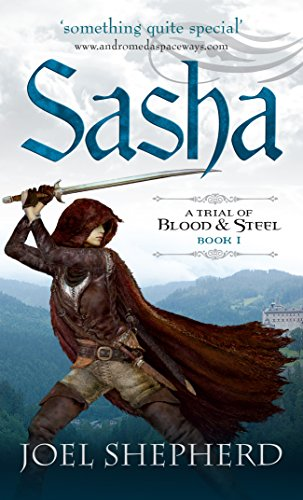
Sasha circled, a light shift and slide of soft boots on compacted earth. The point of her wooden stanch marked the circle’s centre, effortlessly extended from her two-fisted grip. Opposite, Teriyan the leather worker matched her motion, stanch likewise unwavering, bare arms knotted with hard muscle. Sasha’s eyes beheld his form without true focus. She watched his centre, not the face, nor the feet, nor especially the wooden training blade in his strong, calloused hands.
An intricate tattoo of flowing black lines rippled upon Teriyan’s bicep as his arm flexed. Thick red hair stirred in a gust of wind, tangled where it fell long and partly braided down his back. High above, an eagle called, launched to flight from the row of pines on the northern ridge overlooking the Baelyn valley of central Valhanan province. The westerly sun was fading above the ridge, settling among the pines, casting long, looming shadows. The valley’s entire length was alive with golden light, gleaming off the wood-shingled roofs of the houses that lined the central road and brightening the green pastures to either side. Nearby, several young horses frolicked, and exuberance of hooves and gleaming manes and tails. From a nearby circle, there came an eruption of yells above the repeated clash of wooden blades. Then a striking thud, and a pause for breath.
Here we are opening in the story. This is a good example of integrating action into the setting so that you’re building character and setting at the same time. I can’t take the world “frolicked” seriously. It just looks silly to me. Despite my personal distaste for that word, this introduction appeals to me.
One more from Alison: My January favorite read was not fantasy or sci fi, it was Jackson Pearce’s Six Ways to Write a Love Letter, which is all about songwriting and performing and is a romance but super well done. It’s also available on Kindle Unlimited.
3. Six Ways to Write a Love Letter by Jackson Pierce
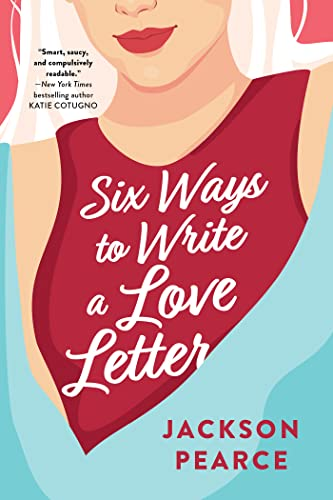
It was midmorning when Remy woke up. Or at least it was probably morning. It was hard to tell sometimes in Venice Beach — the area had that yawning, cheerful sense of dawn late into the day. The sun was always fresh and white-gold, the shadows always gentle and beckoning, the scent of hibiscus and sand and salt always bright in the air.
Nice writing there, but I’m biased. I read this contemporary romance last week, and a review will be appearing shortly. I will just say here that I loved it.
Moving on:
Mary Anderson: I wanted to recommend The Undertaking of Hart and Mercy by Megan Bannen. I picked it up fairly randomly and read it last weekend, and was so pleasantly surprised. Loved the characters, the world building and didn’t stumble over the writing. I kept trying to figure out if I was reading steampunk, or western fantasy, or alternate world. It was cool, and fun.
4. The Undertaking of Hart and Mercy
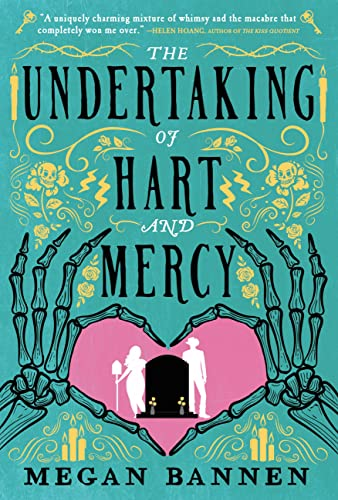
It was always a gamble, dropping off a body at Birdsall & Son, Undertakers, but this morning, the Bride of Fortune favored Hart Ralstone.
Out of habit, he ducked his head as he stepped into the lobby so that he wouldn’t smack his forehead on the doorframe. Bold-colored paintings of the death gods — the Salt Sea, the Warden, and Grandfather Bones — decorated the walls in gold frames. Two green velvet armchairs sat in front of a walnut coffee table, their whimsical lines imbuing the room with an upbeat charm. Vintage coffee bean tins served as homes for pens and candy on a counter that was polished to a sheen. This was not the somber, staid lobby of a respectable place like Cunningham’s Funeral Services. This was the appalling warmth of an undertaker who welcomed other people’s deaths with open arms.
Now, that is funny and unexpected! Actual undertakers — and that last line there is also funny and unexpected. I like this a lot.
Next:
R Morgan:
5. Halls of Law by VM Escalada (Violette Malan).
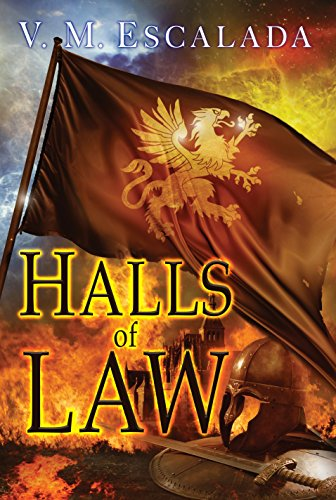
Kerida Nast stood at ease outside the Cohort Leader’s tent, trying hard not to look as though she was listening to the discussion inside. That the Cohort Leader was her older sister Ester wouldn’t make much difference to her punishment if she were caught.
“You people checked her every year from ten to fifteen — like everyone else in the Polity — and never found anything,” her sister was saying. “Talents just don’t manifest this late.”
“It is rare.” the dry voice of the Talent Inquisitor sounded familiar. Kerida held her breath. “but rare is not impossible. We have the right to investigate every reported occurrence of Talent, no matter the circumstances.”
That’s the beginning of a prologue. I didn’t page ahead to see how long a prologue this might be. I’m not especially interested right off the bat. This looks pretty much like The Chosen One With The Special Talent. Talents just don’t manifest this late. I’m sure that when they do, it’s very special. I will add, the inclusion of griffins in this world naturally makes me more interested. From the acknowledgments at the front, it’s clear the griffins are important and, like dragons, griffins improve almost any story.
Next:
Melanie provided several recommendations. Here’s her first:
In YA fantasy, I’d recommend Hilari Bell. … My favourite is the Farsala trilogy – After their highly stratified kingdom is overrun by a neighbouring country, which is kinda like Rome, 3 teenagers from 3 different classes end up working to fight back for independence, and to preserve the best parts of their country, each in their own way, also learning to work together. I enjoyed the worldbuilding and magic, the plotting, and the themes of legendary tales being reimagined to meet current needs.
6. The Farsala trilogy by Hilari Bell.
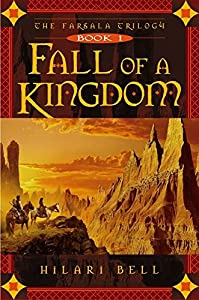
Jiaan ducked, and a bronze cup shaped like a ram’s horn crashed into the wall behind him. It didn’t clatter on the floor, since the thick carpets that had already absorbed its contents muffled the sound. He hoped the carpets wouldn’t be too hard to clean. Jiaan knew that some people found it harder than others to fight off the djinn of rage. But he didn’t think the lady Soraya was even trying.
“Lady, if you’ll just lis–“
“I have listened,” the girl snarled. Her grip tightened on the second cup.
Followed by a detailed physical description of the girl, who was “probably the most beautifully feminine creature Jiaan had ever seen,” so, I mean, that’s a bit of a turnoff for me personally. However, given the description, I would of course turn the page.
Also from Melanie: Also excellent is A Matter of Profit, a standalone novel about interstellar conquest with a pacifist twist. All her work is fun to read and also thought provoking.
7. A Matter of Profit, also by Hilari Bell.
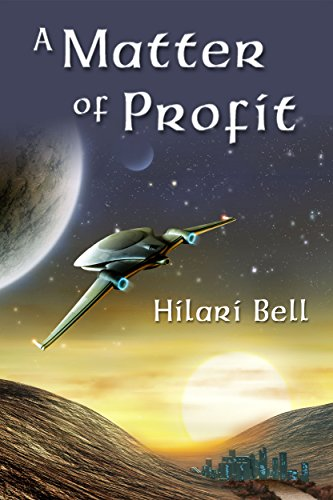
He would have to tell his father. He couldn’t tell his father.
Ahvren hoisted his three overstuffed gear bags and tried not to let his reluctance slow his feet as he boarded the shuttle that would take the spaceline’s passengers down to T’Chin. The voyage from teh Mirmanidan had lasted five interminable months. Ahvren was probably the only one aboard who wished it had lasted longer.
That’s a great couple of sentences to kick off this story. I’m immediately interested and sympathetic. Now, that could change, depending on what Ahvren’s problem turns out to be. But my immediately feeling is very positive.
This is also one of the few beginnings that succeeds even though it avoid using the protagonist’s name in the first sentence, that uses a pronoun instead. I think that may be because the first two sentences are so short and the name is provided in the next paragraph.
Another from Melanie: In YA SF, I’d recommend Maria V. Snyders trilogy Sentinels of the Galaxy. I love the main character here, her relationship with her archaeologist parents, and her growth throughout the story. I think the plotting is very well done, though it is not fast paced. This feels like older YA to me than Bell’s trilogy above. (Even more than above, I do NOT recommend Snyders’ latest series, Archives of the Invisible Sword. I tried the first book, and it was so persistently gruesome it felt more like grimdark to me. The series may end hopefully, but I wouldn’t know. I couldn’t stand it.)
8. Sentinels of the Galaxy trilogy by Maria V Snyders, first book Navigating the Stars
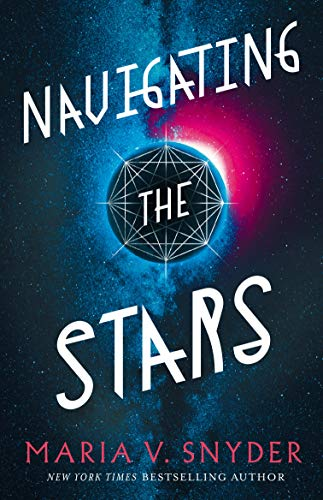
“The answer is no, Lyra.” My mother utters her favorite — I swear — phrase.
“But –“
“End of discussion.”
Arguing is usually futile. But I’m not about to give up. Not this time.
We are having dinner in our housing unit. I’m picking at my reconstituted mashed potatoes, wilted broccoli and mystery protein … er … meat … while my dad scans his list of packing supplies on his portable, only half-listening to my mother’s efforts to convince me that traveling to the new planet will be a grand adventure.
Sounds like there’s plenty of room for growth, as at the moment Lyra sounds like a bit of a twerp.
One more from Melanie: in romance, I’d recommend Jo Beverley. And here I can happily say I like everything by Jo Beverley. She wrote many historical romances set in England: some in the Medieval period, more in Georgian times, and even more in the Regency. All of them are well researched and give you a good sense of the mood and atmosphere of their settings. Most are not low tension, they have quite a bit of high stakes adventure built in. The writing quality seems really good to me, though I am not an expert in that like some people here. I can say that they are intelligent and entertaining. My favourite would be the Malloren series, set in Georgian times, starting with My Lady Notorious. The series gets better as it goes on, so I’m not exactly sure how to suggest you read it. The individual novels do benefit from being read in order, but don’t need to be. My favourite 2 are Secrets of the Night, and Winter Fire.
Why be a slave to convention, right? Here is
9. Winter Fire, by Jo Beverly, book six in its series.
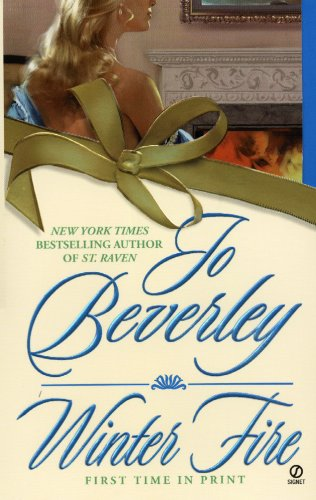
“Many people pray for tedium,” Genova Smith’s mother had often said to her as a girl if she complained that she was bored. It had not convinced her then, and didn’t now. Two long days in a slow-moving coach, no matter how luxurious, had tested her tolerance to the breaking point.
I certainly like Genova’s mother’s turns of phrase better than Lyra’s. I may start quoting that whenever someone complains they’re bored. Of course I’m a big, big fan of a tedious life myself. I have stuff to do. My personal motto could be “No Excitement, Please.”
Okay, of the above, I am have already read Six Ways. I’m most likely to start Fire Logic because people keep mentioning it. I’m drawn to A Matter of Profit, though I know two paragraphs is not enough to actually decide to read something. I think the writing itself looks exceptionally good in The Undertaking of Hart and Mercy, but good in many of these.
Meanwhile! Nine is not a round number.
10. Something to recommend? Drop it in the comments!
Please Feel Free to Share:






The post Nine Recommendations appeared first on Rachel Neumeier.
February 14, 2023
What I’m listening to today
I’ve got music playing in the background right now. This one is new to me. I like it a lot.
***
The Walk Home by Young the Giant
Is anyone out there listening?
I’ve lost myself
Deep in the algorithm of someone else
And under new conditions
I might find that I was always perfectly alone
I like the shift in the last lines from the first stanza to the last, winding up with
And under new conditions
I might find that
We will always walk each other home
You can listen to the song here:
Please Feel Free to Share:






The post What I’m listening to today appeared first on Rachel Neumeier.
How to Write Fantasy
I saw this post, from a blog called Helping Writers Become Authors, via The Passive Voice: Genre Tips: How to Write Fantasy
My immediate reaction: Oh for heaven’s sake, you have got to be kidding me.
Does that seem fair? I’m not sure. It seems to me that the way you write fantasy is to be a fan of the genre, read a bunch of fantasy novels for a decade or more, and then write a fantasy novel without thinking “Now, what is a fantasy novel?” at any time during the process. But maybe it’s actually helpful to some writers to step back and think, “Now, how does one write a fantasy novel?”
What is the advice from this post?
Oh, it’s structured as “Five tips.” Okay, what are the five tips?
1. Is a prologue necessary?
a) First, that’s a question, not a tip; and
b) For crying out loud. No, obviously not, and by asking the question at all, the author of this post is severely dating herself OR showing her lack of broad reading in the genre OR both.
2. Know the world and magic system.
Your fantasy’s geography, culture, and magic system (if appropriate) must all feel just as concrete to readers as would a well-researched story about, say, Paris or Tetzcoco. Don’t kid yourself: research for a fantasy story can be just as extensive as for a historical story.
I think the first part of that is correct. The world has to feel like a real place. The second part is wrong. I can promise you that I have NEVER done ANYTHING LIKE as much research for any secondary world fantasy as for the Black Dog novels.
Wait, I take that back. I did heaps of research for SUELEN. But that was not because of the world or the setting, that was because Suelen is a surgeon. I also did some research on invocations of the sun in order to get ideas for the Golden Invocation. But in general, no way, you absolutely do not have to do as much research for secondary world fantasy as for contemporary fiction or historicals …
… and I realized as I typed that, this probably depends on the author having read a fair bit of fantasy, historicals, maybe sociology and history, because I do draw on all that in order to write secondary world fantasy. That’s not pausing to do additional research, but it’s drawing from decades of reading, so maybe that sort of counts as background research or something.
However, imo, historicals and historical fantasy take, in general, a whole lot more research than secondary world fantasy.
The magic system is important, but a childhood reading fairy tales substitutes for research if you’re writing fairy-tale style magic. If you’re writing magic-as-science or something close to it, then yes, you probably need to figure out how magic works; maybe not right away, but eventually.
Oh, here —
Two fast tips for planning your fantasy world:
The first is: Use Patricia C. Wrede’s amazingly extensive “Fantasy World-Building Questions” to make sure you’re thinking through every part of your world. …
Been a while since I read anything by Wrede! She wrote many delightful novels, all of which I have on my shelves, I believe.
The other tip is about keeping a log of interesting tidbits you happen across in non-fantasy novels. I think that’s fundamentally the same as just reading a lot and getting a feel for those tidbits. I don’t write them down, but sure, good idea.
Meanwhile:
3. Keep track of pacing and plot beats.
The rule here is simple: Just make sure the plot is actually moving (i.e., the story is changing) in each scene and chapter.
Far too many fantasies fill their word counts with characters moving about and perhaps even fighting, but nothing happens because nothing changes. A good way to trim your word count and/or tighten up structural timing is to examine each scene for whether or not it is progressing either the plot or the character’s arc in a meaningful way.
I agree. Things need to happen, which means your protagonist needs to be moving through whatever character arc. That can be as simple an arc as “Character grows up” or much more complex, but whatever’s going on, those events need to affect the protagonist and other characters. This is probably what people mean when they say, “Wow, 200 pages of a journey in TASMAKAT, but it doesn’t drag because SO MUCH HAPPENS,” and what they mean is not exciting fight scenes, but intense conversations and — this is important — movement along the character arc.
4. Choose your protagonist and other characters carefully.
And first, I think that’s a no-brainer, but second, I think it is indeed worth mentioning.
For me, Elizabeth Moon’s Kings of the North series failed to hold my interest because I was uninterested in most of the characters and the characters I loved got too little time on the stage. In particular, I found Arcolin just boring. Stepping out of his pov into someone more interesting would have been super useful for that plotline, and I nominate the officer Arcolin hires at the beginning, the one who had lost a hand. I don’t recall that character’s name, but he was much, much more interesting and appealing, and to me he was the obvious choice to carry that point of view. So this is what leaped to mind with this tip about choosing your characters carefully. The captain of the mercenary troop may be the obvious choice, but is he the best choice? Maybe the best choice is not the guy at the top, but someone else, someone with more challenges to overcome or more inherent conflict in his potential character arc.
5. Theme is crucial
These days, fantasy has become so mainstream we accept its tropes as part of our own reality.
Emphasis in original. That’s a really interesting observation. It would be interesting to try to write an essay defending that assertion. I’m not sure this is how I would put it. I think I would say that fantasy reflects themes that are inherently central to human society, not that themes central to fantasy have unexpectedly invaded mainstream understanding of society.
One of the most magnificent features of fantasy is its ability to access this potent symbolism—I call it a “hotline to the subconscious.” Not every fantasy story will necessarily dial up this hotline on purpose, but because the genre itself exists as a sort of “metaphor” for real life, it’s capacity for symbolism is almost unavoidable. If you can wield this power consciously, you can significantly up your story’s potential.
Hmm. Is that different from storytelling in general? I believe I would say no. I think I would suggest that what the author of this post thinks is important in modern fantasy — fantasy these days , as she says — is actually embedded in fairy tales that we read in childhood, and that those fairy tales have emerged from oral traditions that go way way way back and encompass truths essential to human experience. That’s why symbolism from fairy tales can be so powerful.
I do not, of course, agree that you need to think consciously about symbolism when writing because the back of my brain handles all that below the level of conscious awareness. That’s why I frequently realize what an important theme of one of my novels is only after a reader says, “The important theme _____” and I say, RIGHT, YES, THAT’S THE THEME. These days sometimes I see important themes myself, but certainly not always.
I think advice like this — wield this power consciously — probably contributes to the way so many prospective writers seem to be inhibited about just jumping in and writing a novel. No wonder they hesitate if they think they need consciously design the story to wield potent symbolism! That would be a nerve-wracking thing to try to do!
Well, overall, maybe the linked post is worth reading and thinking about, but my feeling as I read it is that I’m glad there wasn’t so much writing advice around when I started writing. I think advice like this about how to write a fantasy novel makes it sound difficult and intimidating. I think I would rather just see advice that goes:
If you think you’d enjoy playing around with writing a novel, jump right in and try it. Don’t take it too seriously. Just take a stab at writing e a story you’d enjoy reading and see how it goes.
Please Feel Free to Share:






The post How to Write Fantasy appeared first on Rachel Neumeier.
February 13, 2023
Update: Not much progress
Okay, so, not a lot happened last week.
A) Sherwood Smith asked for a rush beta read for her latest. It’s a book set after the Norsunder War quadrilogy, it focuses (more or less) on Liere and Senrid, and it features one of the most opaque characters I have ever seen in any novel, and I do mean ever. He was interesting from the first time we met him — in the Norsunder War books — and takes a central role in this book, and it’s been fascinating watching him move through this elaborately braided story. Is he a good guy? A bad guy? Both?
Anyway, that was 200,000 words or thereabouts, and reading carefully while noting typos and making comments is a bit slower than just reading, so that was a lot of what I was doing last week. I just sent the manuscript with comments back a few minutes ago.
B) I now have comments back from everyone on No Foreign Sky. I read through the broad comments and made a bulleted list of tweaks, one of which is pretty important, I think. I’m definitely tired of messing with this manuscript, but when I step back and consider the comments as objectively as possible, I don’t honestly think it will take TOO long to go through the story one more time. I may not get through it this week, but likely two weeks will be about enough.
I will just mention that there’s considerable variation with regard to reader responses to the first chapter of this book. (Explain more / don’t explain more.) I’m going with not explaining more. I am actually pretty much okay with dropping the reader into a fast-paced situation where a lot needs to be figured out on the fly. I realize that may not work as well for every reader, but I think that’s how I’m going to do it.
I will share part of the first chapter with you pretty soon, though, probably as soon as TANO is out, and you can see what you think.
C) Sorry that TANO isn’t up on Amazon yet. The cover artist hasn’t gotten back to me with a new draft yet. Probably that will happen in the early part of this week.
Meanwhile, the new proofing copy arrived, so I spent a lot of time yesterday reading through that with a pencil in my hand. How many actual typos have I found? Three, which seems pretty good! One was a missing period, one was a word that was plural when it should have been singular, and I don’t remember the third offhand.
What I’m really doing — I mean, I’m really and truly reading for typos, sure — but what I’m REALLY doing is tweaking. While I fully recognize that it’s impossible to open any novel, even years after it was published, and not want to mess with commas, this is the last chance for me to do that before publication. Move phrases around, delete phrases, fiddle with the wording here and there, take out a comma , add a comma — that’s what I’m doing. I’m enjoying it, actually. I won’t enjoy opening all three files and making all the little tiny changes. That is going to be utterly tedious. I will do it tonight. I hope it takes less than an hour. It certainly shouldn’t take more than one evening …
… even though it’s going to be above 60 degrees F today and I will absolutely take all the dogs out for a run.
Please Feel Free to Share:






The post Update: Not much progress appeared first on Rachel Neumeier.
February 10, 2023
Recent Reading: Emily Wilde’s Encyclopaedia of Faeries
So, commenter Robert pointed me to Emily Wilde’s Encyclopaedia of Faeries not all that long ago, saying that he was pretty sure it’d be just my kind of novel. Robert said: The entire time I was reading this, I was thinking that it would be right up your alley. It’s charming without being cutesy which appears to be a difficult thing to achieve. He was absolutely right. I loved just about everything about this book.
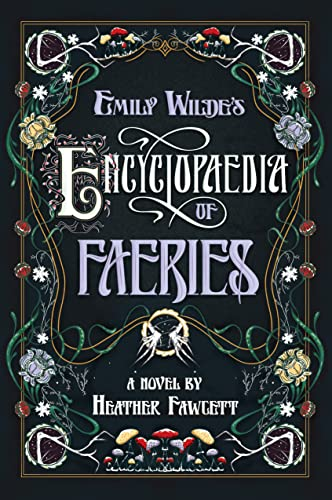
This is an epistolary novel, told as diary entries. Here’s how it opens:
20th October, 1909, Hrafnsvik, Ljosland
Shadow is not at all happy with me. He lies by the fire while the chill wind rattles the door, tail inert, staring out from beneath that shaggy forelock of his with the sort of accusatory resignation peculiar to dogs, as if to say: Of all the stupid adventures you’ve dragged me on, this will surely be the death of us. I fear I have to agree, though this makes me no less eager to begin my research.
Herein I intend to provide an honest account of my day-to-day activities in the field as I document an enigmatic species of faerie called “Hidden Ones.” This journal serves two purposes, to aid my recollection when it comes time to formally compile my field notes, and to provide a record for those scholars who come after me should I be captured by the Folk.
So, that pretty much tells you about the setting, doesn’t it. And quite a bit about Emily too. Not very much about Shadow, yet, but he’s now among my favorite fictional dogs.
The writing is absolutely top notch. Just wonderful. Robert mentioned that some reviewers find this novel slow-paced. He didn’t, and I sure didn’t. I found the pacing absolutely perfect for the story being told. There’s lovely description of a setting that sometimes becomes thoroughly surreal, and Emily’s voice comes through very clearly. So does Wendell’s voice, partly through Emily, but Wendell also writes a couple diary entries. More about Wendell in a moment.
The characterization is extreme, but very well done. Emily is about the most socially withdrawn protagonist you can imagine, neither good at nor interested in interacting with people … or she sure thinks she’s not interested in ordinary social relationships … let’s say she’s very difficult to come to know, and very easy to misinterpret. She’s another protagonist who fits the category “unlikeable in story terms, but the reader is going to love her.” Not every reader, I expect. Emily is indeed cold-hearted at times. I found her much more appealing than Miryem from Spinning Silver because Emily is not mean, but I have to say, she can be indifferent.
Spinning Silver actually provides a fantastic comparison in multiple ways with Encyclopaedia of Faeries.
In Spinning Silver, the Staryk are Fey who are (a) incomprehensible and terrifying, and (b) winter elementals.
In Encyclopaedia of Faeries, the faeries are (a) incomprehensible and terrifying, and (b) the ones here in Ljosland are winter elementals.
How about that? I would never have expected to trip over two different novels that both treat the fey in almost exactly the same way in just a matter of a couple of weeks, but here we are! Also, though there are (of course) many differences, both novels have difficult protagonists, each with a romance arc that unfolds slowly.
From the description: But as Emily gets closer and closer to uncovering the secrets of the Hidden Ones—the most elusive of all faeries—lurking in the shadowy forest outside the town, she also finds herself on the trail of another mystery: Who is Wendell Bambleby, and what does he really want? To find the answer, she’ll have to unlock the greatest mystery of all—her own heart.
The implied romance is understated. No, whatever you just thought of, it’s even more understated than that. Emily doesn’t have a romantic bone in her body. I enjoyed this tremendously.
Wendell is a fantastic character. Just fantastic. Socially smooth, much more of a dilettante — Emily is a great and committed scholar, a serious expert who is excellent at every part of fieldwork other than dealing with people. Wendell is great with people, but vain, lazy, and comfort-loving and also by the way really into clothes — he reminds me a bit in that way of Mirnatius in Spinning Silver. (In other ways, not so much.)
To sum up:
Writing — top notch; really lovely. Also, I learned a new-to-me word: solivagant. Did any of you know that word?
Characters — top notch; so much fun
Worldbuilding — top notch in a fairy tale kind of way
Plotting — Okay, now, it’s hard to compare anything to Spinning Silver in terms of plotting. That one is so precise and elegant that it’s really not a fair comparison. But the plotting in Encyclopaedia is just fine. This one doesn’t echo with familiar fairy tales, but it does draw on an understanding of fairy tales, of how stories like that should go. This is quite explicit. Emily writes: The truth is, for the Folk, stories are everything. Stories are part of them and their world in a fundamental way that mortals have difficulty grasping; a story may be a singular event from the past, but — crucially — it is also a pattern that shapes their behavior and predicts future events. This is both literally true in the novel and also crucial for the climax of the plot.
Who would love this book:
If you loved Spinning Silver, I do think you ought to try this one. I’d be really curious how you thought it compared.
If you loved Marie Brennan’s A Natural History of Dragons, then Encyclopaedia is a no-brainer.
If you enjoy fairy tale retellings and might enjoy a fantasy novel that is not a retelling but draws heavily on fairy tales, then certainly try this one.
I don’t much care for the fey as a rule, but if you do, here you go.
Please Feel Free to Share:






The post Recent Reading: Emily Wilde’s Encyclopaedia of Faeries appeared first on Rachel Neumeier.
February 9, 2023
Not the final cover
Okay! Always exciting to get the draft of a cover!
This won’t be the final version, but here, take a look:
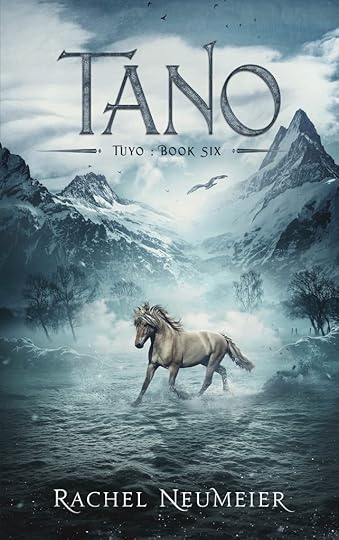
Why not the final version? Because (a) there shouldn’t be trees; this is essentially tundra; (b) I would prefer the pony to be galloping. This is the first time I have asked for more action rather than less! I have constantly been saying, “The tiger isn’t snarling or attacking; he’s just there.” But this time, there should be a sense of urgency, so the horse — pony, excuse me — should be galloping.
Good start though, and I’ll try to remember to always ask for an eagle in the background of every book where Tano is the point of view protagonist.
Question! Because of the way the Ugaro refer to colors — the snow-colored stallion, for example — I have referred to Tano’s pony as “mouse-colored” several times in this book. What is the color of a mouse? What does “mouse-colored” make you think of?
Here is a deer mouse:

Here is a house mouse:
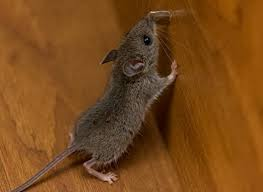
They are not that different in color, but the house mouse is a bit more on the gray side, the deer mouse a bit more on the brown side. The horse on the TANO cover draft falls enough in this color family that “mouse-colored” works for ME, but what about other people? Would a pony with this kind of color work for you if the description says “mouse colored?”
This is of course easy to change. What is another word for this pale dun or pale wheaten type of color?
You know what colors Chesapeake Bay Retrievers come in? Brown, light brown, deadgrass, light deadgrass, sedge, and ash.
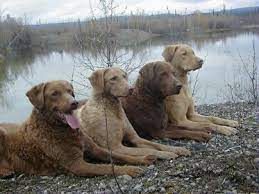
Public Service Message: Chessies are not a great breed for the casual pet owner. They are not Labradors with funny coats and emphatically not Goldens with funny coats. They’re too much dog for most people — too intense, too much working drive, too stubborn, too hard-headed, too liable to dislike being touched by strangers. They are absolutely ideal for hunting geese in Canada, but they are absolutely not ideal for lounging in the house to give a home a comfortable doggy ambiance.
I really like those color names, though. Not that I would call a pony “deadgrass color” because that definitely sounds distracting and wrong in the context of a novel. Maybe I might say “ash-colored.” I will think about that if you all vote against “mouse-colored.” Also, I’m waiting to see the color of the pony on the final version of the cover before deciding for sure how to describe that pony. “Dun” is a color name the Ugaro use.
ALSO: Yes, the cover for TASMAKAT has now been updated to say Book Seven. If that isn’t showing on Amazon yet, it will soon. Otherwise I bet that would have been pretty confusing, two books both saying Book Six! I’m glad to say that it was no trouble at all to re-order the books in the series.
Please Feel Free to Share:






The post Not the final cover appeared first on Rachel Neumeier.
Captivating Endings
A post at Jerry Jenkin’s blog: How to End a Story: 3 Secrets to Writing a Captivating Ending.
This caught my eye because I’ve been posting recently about books with great ending. Three secrets. Well, I’m sure they’re not “secrets,” but perhaps tips. What does Jenkins have in mind? He says: You must know how to end a story worthy of the time and loyalty readers have invested in you. Your ending should be memorable and emotionally satisfying, tying up all loose ends.
Well, ALL the loose ends may be a bit of an overstatement. Most of the really crucial loose ends, sure, but hooks for a sequel are both typical and generally fine. But I certainly agree that a great ending should be both emotionally satisfying and memorable. That’s certainly ideal.
All right, what are these secrets (or tips)? Here they are:
Keep the end in sight the whole wayNothing can follow the endDon’t forget your heroThat’s a bit funny! I’m thinking of the first point. Jenkins writes: Don’t play the wishing game, hoping it will simply work itself out when the time comes, but the fact is, I’ve written a good many books without knowing what the ending was going to be until I was practically on top of it. That’s perfectly ordinary for me. It’s unusual for me to know what’s going to happen at the end — the fundamental ending to TASMAKAT was crystal clear to me long before I started writing it, but that’s rare. Even then, certain important details about the climax and the denouement came to me as I got there, not beforehand.
Then Jenkins adds: think about your ending every day, and again, I’m pausing here. If you’re stuck in the middle and trying to beat your way through that section, then maybe you should be thinking about that part? Although I guess if you have an ending in mind, that can help guide your steps as you hack your way through the middle. But it doesn’t always do so in practice, in my experience.
To me, that looks like a tip for the outliner, not like a tip for everyone.
But I do like this part:
Be generous with your readers. They have invested in you and your work the entire way. Give them a proper payoff. Don’t allow it to look rushed by not allowing it to be rushed.Make it unpredictable but fair. You want readers to feel they should have seen it coming — because you planted enough hints — but not feel hoodwinked.Never settle. If you’re not happy with every word, scuttle it until you are.I think all that is true. I did heavily revise the very last chapter of TASMAKAT twice because I was following the rule “never settle.” It’s best never to settle for something you know is not quite right, but absolutely crucial not to do so at the end.
Now, what does this second point mean, that nothing can follow the end? It can’t mean “nothing can follow the climax” because of course there’s almost always a denouement, which is often one of my favorite parts both as a reader and a writer. Also, what about epilogues? TANO includes my first epilogue, and I think it works well, and first readers agree about that. Don’t epilogues by their very nature follow the end? Let me see what Jenkins says about that, if anything:
Oh, he doesn’t mean “nothing comes after the end.” He means “the end must offer a sense of resolution.” [T]he reader knows what happened, questions are answered, things are resolved, puzzles are solved. Yes, in that case, by all means. I vividly remember that one reason (ONE) that I hated Tana French’s book In the Woods was that the initial mystery (what happened to those kids and how did the shoes get filled with blood?) was never answered. That wasn’t what most enraged me about that novel, but it sure didn’t help.
Yes, the novel ought to offer resolution and closure. If one book ends on a cliffhanger, that’s not the end; the story itself should end with resolution and closure, whether that’s at the end of the first book or the second or third or wherever.
But I’m surprised Jenkins phrased it this way: Nothing comes after the end, and doesn’t say a word about epilogues. I’m trying to think now about epilogues I particularly enjoyed. I’ll have to consider that and maybe write another post.
But how about the third tip: Don’t forget your hero? What does that even mean? Are there novels where the author wanders away from the protagonist and doesn’t come back? That seems unlikely. I think most authors understand that if you open with one character, then unless that character dies, the last chapter needs to come back to that character. Does Jenkins think that authors need a reminder that they should come back to their protagonist at the end? If not, what does he have in mind? Let’s see … yes, that’s part of what he’s saying:
Your lead character should be center stage at the end. Everything he learned throughout all the complications that arose from his trying to fix the terrible trouble you plunged him into should by now have made him the person who rises to the occasion. Maybe to this point he has been flawed, weak, defeated. But his character arc is about to resolve and become complete. The action must happen on stage, not just be about or remembered or simply narrated. It can’t be resolved by a miracle or because he realizes something. He must act.
This is more than just “You should focus on your protagonist at the end.” This advice is more, “Your protagonist has to drive the climax.”
I started to repeat that really, I don’t know that this advice is necessary. But I can think of one book I quite liked that violated this rule, and I did think the ending let the story down substantially. That book was Sinner by Greg Stolze, and I want to repeat that I did like this book, which is clever, fun, with neat revelations and good writing. But the extended ending, I’m not sure whether it was called an epilogue, was all remembered and narrated, not experienced. I thought: What gives? Did the author get bored and decide not to finish the book? And of course I don’t know, but I do know that the ending did not work well and this was because the action did not happen on stage.
Jenkins goes on to identify six types of story endings:
ResolvedOpenAmbiguousTwistClosed circleEpilogue! There’s where he’s putting the epilogue!I’m puzzled about why he seems to speak of open and ambiguous endings and epilogues favorably in this section when earlier he said Nothing After The Ending. But he absolutely does say here that cliffhanger endings are dandy for driving the reader toward your next book. He also mentions bittersweet endings and bitter endings and says End your novel well, but don’t feel like you have to end it perfectly. That seems to contradict his earlier advice that the ending needs to be emotionally satisfying and tie up all the loose threads and so on. I guess some readers find bitter endings satisfying, somehow, but still. This is a puzzle. It’s a bit like he wrote two different posts about endings with different advice and then jammed them together.
This post made me curious about what other advice might be out there about writing the ending, so here’s a different post about endings from a blog called The Write Life: How to End a Story.
[W]hat if your story finishes on a weak note?
Because it’s the final experience readers have before putting your book down, it leaves a lasting impression. Most people don’t finish books the books they start to read. Those who do are the most invested readers out of everyone who chose your book. It makes sense that they would be strongly let down by an unsatisfying conclusion.
Very true! This post then offers six suggestions for how to end a novel, and at once I’m wondering whether these will echo the six types of endings Jenkins listed, shown above. Let me list these very briefly and let’s compare:
Neat and tidy, eg resolvedCliffhangerTwistAmbiguousEpilogueCyclicalThat last one is different! I was thinking these lists were going to be identical, but not quite! A cyclical ending isn’t the same thing as simply ending things as they started. Even though the story might begin and end in the same place, the readers should have been on a journey alongside the characters who have developed or learned something along the way.
I rather like the idea of the cyclical ending — of coming home.
The Lord of the Rings is of course like this, and that works very well. Stopping with a celebration in Gondor after the victory would have been VERY different from returning to the shire, and I will add here that I was thinking of The Scouring of the Shire as kind of an epilogue and very much an example of the sort of ending that turns out to be maybe my favorite part of the whole story. I love that part, and I wonder if part of the reason is the sense of closure, of the characters coming home after having grown into themselves and putting things at home back in order — a return of a different sort, a re-creation of a home that had been seriously damaged.
Okay! My final comment:
A cliffhanger is not the ending, or if it is, then that means the author has failed in a very serious way. (Pegasus, I’m thinking of you.) This does not belong on a list of “types of endings” because it’s not an ending; it’s a dramatic pause before the story continues.
When the first or second book of a series ends on a cliffhanger, that doesn’t count as the ending AT ALL. The final ending of the whole story is the actual ending. I’m tempted to go back up to those lists and strikethrough “cliffhanger” on both lists because that is just not right.
Also, in my opinion — unlike the above, I’m willing to change my mind about this — an epilogue is a specific technique, but it’s not a specific type of ending. The epilogue is used to tie up threads and settle all the important characters in place and therefore this is a special case of the “resolved” or “neat and tidy” ending.
Your choices when ending a story therefore fall into four categories, not six:
Resolved, including possibly in an epilogueAmbiguousTwistCyclicalI will finish this post by adding: I’m trying hard not to say too much, or anything really, about the ending of TASKMAKAT in the context of this post.
I just mention this so you will all sympathize with how difficult it is for me not to tell you many things about it. Seriously. It’s just painful.
Please Feel Free to Share:






The post Captivating Endings appeared first on Rachel Neumeier.
February 8, 2023
Why to Write a Novel While You’re In College
So, this post at, let me see, Write to Done, caught my eye: 3 Reasons to Write a Book in College
Because I wrote my first fantasy trilogy while I was in grad school. I actually did have three reasons, and here they are:
A) I was avoiding doing the statistical analyses necessary to write my master’s thesis.
Or, I mean, maybe avoiding other associated tasks. I sure remember avoiding the stats, though. This was also in the era when you’d tell your computer, “Okay, run paired t-tests for these 27 variables” and then you’d go to lunch. If nothing went wrong, the results would be waiting for you in an hour or two. If anything did go wrong, of course, you’d have to start over.
Ah, those were the days! Printer paper had edges you had to rip off, too, generating swoops of paper strips for the kitten to play with.
B) I wanted to improve my typing speed.
I’d just taught myself to touch type, so I was typing various essays and things that I liked in order to increase my speed, and starting to write a novel was another way to do that.
C) I read a fantasy novel and thought, “You know, I absolutely COULD do better.”
I have to admit, I do not remember which novel that was, but I guess I owe a debt to the author for writing a not-very-great novel and thus inspiring me to take a stab at doing it better.
I’m guessing that “A way to avoid doing your crucial statistical analyses” is not going to be offered as a reason for why you should write a book while you’re in college, partly because you’re seldom doing statistical analyses while you’re an undergrad, but mostly because obviously it’s better to do your homework promptly, not write a novel in order to avoid doing your homework. Though, I mean, if you’re going to put off doing your homework, at least you’d have a novel to show for all that procrastination, so there’s that.
I’m also guessing they’re not going to pick improving typing speed as a reason, but I think that this is actually a good reason. Quite a lot of students are slow with typing because they just don’t get enough practice typing at length on a real keyboard. If they write a novel, they will get faster for sure.
Also, one more very important reason:
D) I had time.
You may feel that you’re busy when you’re in college, but if you’re a traditional student, you really aren’t all that busy, probably. Do you have a small child or three? No? A full time job? No? Then you most likely do have time to write a novel, far more time than you may have during the decade when you’re just out of college and building a life. This is even more true when you’re an undergrad than when you’re a grad student.
I’ll pause here to add that I’m in awe of any writers who manage to write books when they DO have small children. Wow.
Anyway, sure, back to the linked post! What are the “three reasons to write a book in college?”
Here they are, paraphrased somewhat.
1) Express your deeper beliefs. Do you have views or beliefs that aren’t reflected around you in college? Writing a book can give you a release. It’s entirely your project, free of judgement.
Goodness, I would never have thought of that. Seriously, I would not.
I was thinking: Write a story. Write a good story. Have fun writing a story. I was not thinking: Express your deeper beliefs.
But … sure, I guess? If you find that motivating? To me, that looks kind of like, I don’t know, setting out to write a statement of personal philosophy, but that’s not a book, that’s an actual homework assignment I was actually assigned, twice. I didn’t enjoy it either time. I would never in a zillion years sit down with this in mind.
2) You’re ready to write a book. You’re already in college. If you’ve made it to college, you have the raw ability to do this. It’s just a matter of believing in yourself and making it happen.
Well, I wouldn’t have said that either, quite. I would say that you might have the raw ability to start to learn how to write a novel, which of course you actually learn by doing it.
Or you might not be ready to even start learning how to write a novel. Although I work with some students who are quite good at writing, I also work with many basically illiterate students. They’re even passing English Comp I. But that doesn’t mean they can write a sentence that means what they think it means.
On the other hand, hopefully most students who are even thinking of maybe writing a book are basically on good terms with the muse of language. (Yes, I was thinking of Slushkiller by Teresa Nelson Hayden when I wrote that sentence.)
3) Make yourself stand out when it comes time to write a resume.
Not to put too fine a point on it, but I think this is an insane reason to write a book. Does the author of this post actually write books? Are they familiar with how many hours of your life that takes, especially when you’re just figuring out how to do it at all? For crying out loud, there are ten thousand other things you can do for this purpose, and virtually all of them will take much less time.
I notice the author of the post is unknown. It just says “guest” and there’s no information about this person.
Well, my advice is, absolutely do not write a novel just to be able to say on your resume that you wrote it. Seriously, no, do not do that.
The actual best reason to write a novel:
Write a novel because you think it might be fun to write a novel. Write a novel to find out if you can write a novel and if you enjoy writing novels.
Don’t do it to enhance your resume or to show off to other people that you can write a novel. Get your mind away from external validation. That’s really unlikely to be a helpful focus.
And if you want it to be a good novel, forget about expressing your deepest beliefs. Just write a story and trust that those beliefs will settle way down deep in the subtext as long as you don’t try to force them into the text.
Also, just a tip, but those statistical analyses or whatever need to get done eventually, so probably you should do them.
Please Feel Free to Share:






The post Why to Write a Novel While You’re In College appeared first on Rachel Neumeier.



